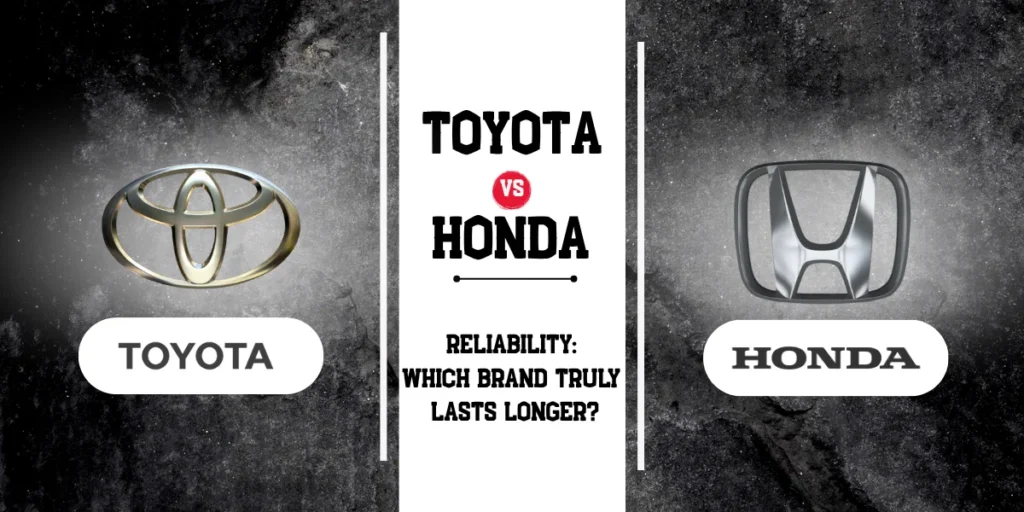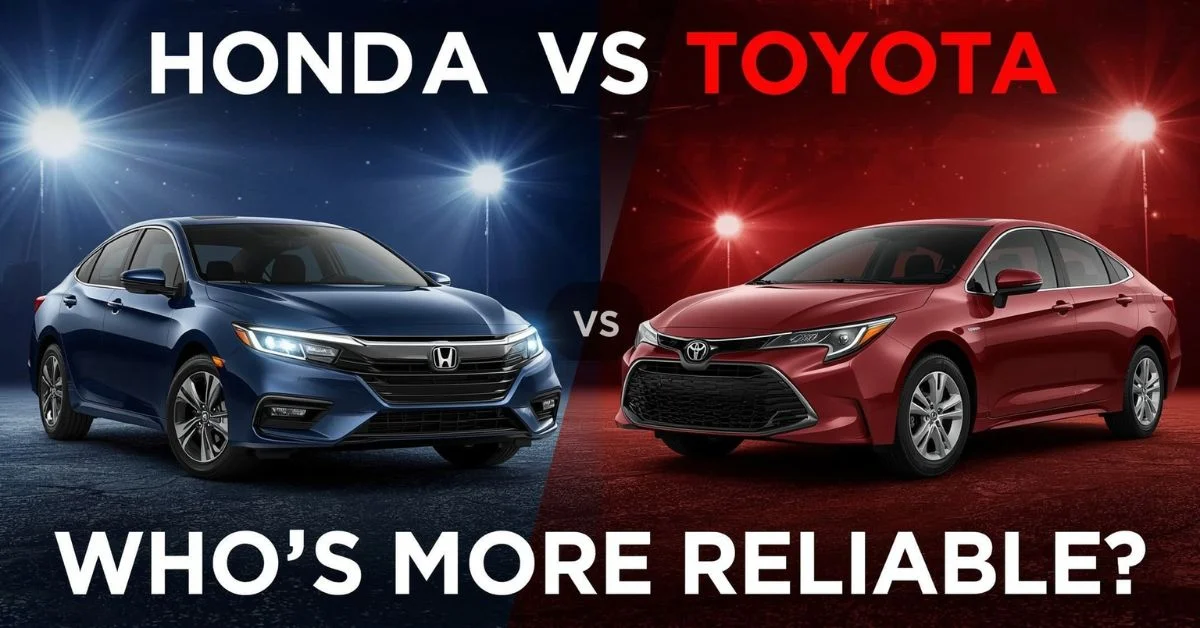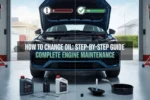If you’re searching for a dependable and budget-friendly used car, deciding between toyota vs honda reliability can be a challenge. To help you make the right choice, this comparison highlights two of the most popular Japanese automotive leaders. In today’s highly competitive U.S. market, nearly one out of every nine cars produced is either a Toyota or a Honda a testament to their worldwide popularity. Below, we’ll explore the key differences and advantages of Toyota and Honda vehicles to help you pick the right fit for your needs.
Toyota vs Honda Reliability
Honda has built a strong reputation for reliability, often earning top marks from industry experts. RepairPal, for instance, rated Honda 4.0 out of 5.0, ranking it first out of 32 brands for dependability. Toyota also holds a longstanding reputation for durability and consistency, with the 2024 J.D. Power study highlighting its strength at 147 problems per 100 vehicles (PP100). Both brands reflect core Japanese manufacturing principles: durable components, practical interiors, reasonable pricing, and a wide range of trims to suit different buyers. Honda is especially praised for its long-lasting engines and minimal service needs, while Toyota is celebrated for vehicles that run smoothly for decades and maintain excellent resale value.
Most Reliable Used Models
If you’re browsing the used market in 2025, these Toyota vs Honda models stand out for reliability and value.
Best Toyota Models
- Toyota RAV4 Hybrid: Excellent fuel efficiency with long-term dependability.
- Toyota Highlander (2017–2022): Strong V6 engines and smooth transmissions.
- Toyota Corolla Hybrid: Reliable daily commuter car with exceptional longevity.
Best Honda Models
- Honda CR-V Hybrid (2020+): Resolved earlier oil dilution concerns; spacious and dependable.
- Honda Pilot: Family-friendly midsize SUV with strong reliability ratings.
- Honda Accord: Naturally aspirated 2.0L engines outperform turbo variants in long-term dependability.
Known Problems for Each Brand
Even the most reliable brands have their common issues.
Toyota Issues (2025)
- Older models (e.g., 2012–2014 Camry) suffered oil consumption and transmission problems.
- 2025 Toyota bZ4X EV faces infotainment glitches, charging issues, and power dips.
- Brake noise and lackluster braking performance in some models.
- Sticky or difficult gear shifting in older/manual vehicles.
- ECU defects and weak 12V batteries on hybrid and electric models.
Honda Issues
- Turbocharged Civics and CR-Vs (2016–2018) experienced oil dilution.
- Transmission failures in models like the 2013–2015 Accord and Civic.
- Infotainment glitches in some trims.
- Expensive hybrid battery replacements.
- Turbo engines tend to have more issues than Honda’s naturally aspirated ones.
Best Value Cars for Budget-Conscious Drivers
Here’s how some of the most popular models compare in reliability and cost of upkeep.
| Model | Reliability Score | Annual Maintenance Cost |
| Toyota RAV4 Hybrid | 4.5/5 | $350 |
| Honda CR-V Hybrid | 4.3/5 | $375 |
| Toyota Highlander | 4.4/5 | $420 |
| Honda Pilot | 4.2/5 | $450 |
What Brand Has Lower Maintenance Costs, Toyota or Honda?
In 2025, Toyota vs Honda continue to lead in resale value, with Toyota slightly ahead as models like the Corolla, Camry, and Tacoma hold about 62–64% of their value after five years, compared to 60–61% for Honda’s Civic and Accord. Both brands are affordable to maintain, with Honda being marginally cheaper, and remain popular picks in Indiana, where the Corolla and Civic are favored for reliability and low costs. SUVs such as the Toyota 4Runner and Honda CR-V also perform well in holding value. Despite factors like rising interest rates, fast EV advancements, and the demand for modern features, strong reliability and consumer trust help both brands maintain their resale power.
Driving Experience: Comfort vs Sportiness
When it comes to driving experience and technology, Toyota vs Honda bring two distinct philosophies to the road. Toyota leans toward comfort and reliability, offering a smoother, more predictable ride that makes every day journeys relaxed and stress-free. With consistently high safety ratings and hybrid batteries engineered for long-lasting durability, Toyota blends peace of mind with forward-thinking efficiency. On the other hand, Honda appeals to drivers who enjoy a bit more thrill behind the wheel. Known for sportier handling and sharper dynamics, models like the Accord and Civic deliver responsive acceleration and confident cornering, making every drive feel more engaging. Together, these brands showcase how different approaches to driving technology can meet the needs of both comfort seekers and performance enthusiasts.

Toyota vs Honda: Comfort, Performance, and Value Compared
| Reliability | Higher overall reliability ratings | Very reliable, but slightly behind Toyota |
| Resale Value | Stronger long-term value retention | Good resale, but lower on average |
| Lifespan | Longer with proper maintenance | Long-lasting, especially sedans |
| Maintenance Costs | Slightly higher | Lower on average |
| Driving Experience | Smooth and comfortable | Sporty and responsive handling |
| SUV Lineup | Rugged (4Runner, Highlander, Land Cruiser) | Strong CUV lineup (CR-V, Pilot, Passport) |
| Truck Models | Tacoma, Tundra available | Limited truck options |
| Sedans | Corolla, Camry (spacious, reliable) | Civic, Accord (affordable, efficient) |
| Hybrid/EV Options | Prius, RAV4 Hybrid, bZ4X (wide lineup) | CR-V Hybrid, Accord Hybrid, Prologue EV |
Vehicle depreciation trends in 2025
In 2025, both Toyota vs Honda remain strong leaders in resale value, with Toyota holding a slight edge models like the Corolla, Camry, and Tacoma retain over 62–64% of their original value after five years, while Honda’s Civic and Accord stay close behind at around 60–61%. Maintenance costs for both brands are impressively affordable, well below industry averages, with Honda being slightly cheaper to maintain. For buyers in Indiana, the Corolla and Civic rank as top choices for dependable, cost-friendly transportation, while SUVs like the Toyota 4Runner and Honda CR-V also hold their value well. Market trends such as high interest rates, rapid EV evolution, and demand for modern tech features affect depreciation, but Toyota vs Honda reliability and strong buyer demand continue to keep their resale strength intact.
Which Car Is Right for You?
For daily commuting, the Toyota Corolla Hybrid and Honda Insight both offer excellent fuel efficiency and reliability. Families can choose between the spacious Honda Odyssey or the versatile Toyota Highlander, depending on their space needs. SUV buyers will appreciate the Toyota RAV4 for its lower costs, while the Honda CR-V delivers sharper handling. For performance enthusiasts, the Honda Civic Type R offers driving thrills that Toyota doesn’t currently match.
Conclusion
If you’re on a tight budget, a used Toyota is a clear winner. With more standard features and a reputation for exceptional longevity, a used Toyota often delivers better value and can last longer than a comparable used Honda. However, if performance is a priority, Honda is the better choice. Honda vehicles offer more engaging handling and a sportier driving feel, and their SUVs typically provide more spacious luggage compartments. Ultimately, whether you choose Toyota or Honda, both brands offer reliable, well-built vehicles that cater to different driving needs and preferences.
Frequently Asked Questions
Which brand holds value better: Toyota or Honda?
Toyota tends to hold its resale value slightly better than Honda, thanks to its reputation for reliability and lower long-term repair costs.
Which brand is more reliable: Toyota or Honda?
Both brands are known for long-lasting cars, but Toyota often has a slight edge in overall reliability due to fewer major repairs over time. Honda still performs exceptionally well, especially with proper maintenance.
Do Toyota or Honda vehicles last longer?
On average, Toyota vehicles can reach 200,000–300,000 miles with routine care. Honda vehicles also last long, but some models may require more frequent major repairs after 150,000 miles.
Are maintenance costs higher for Honda than Toyota?
Generally, Toyota maintenance costs are slightly lower than Honda’s. Both brands are affordable compared to European cars, but Toyota parts are often easier to source and cheaper.
Should I choose Toyota or Honda for a used car?
If you prioritize long-term reliability and low maintenance, Toyota is often the safer bet. Honda is still a great option, especially for drivers who prefer sportier handling and engine performance.










